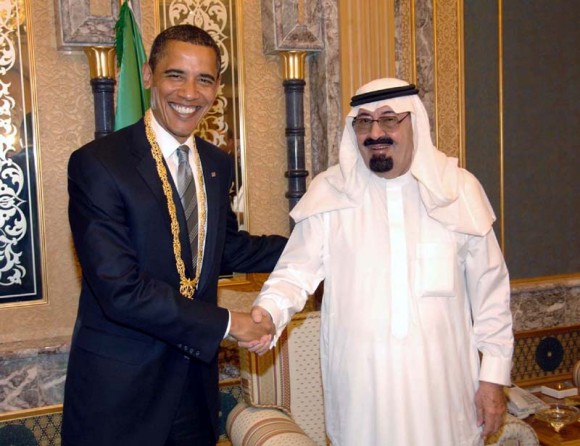
Much has been made recently of the apparent tension between the U.S. and its longtime ally, Saudi Arabia. The thinking essentially goes like this: Washington hasn’t sufficiently bowed to Saudi interests on issues like post-Mubarak Egypt, the Syrian civil war, and the diplomatic opening with Iran. The Saudis would have preferred the Obama administration to crush the Egyptian revolution at the outset, intervene in the Syrian civil war to unseat Bashar al-Assad, and to resist a diplomatic opening with Iran, none of which happened.
Saudi Arabia’s ambassador to Britain wrote an op-ed in the New York Times entitled “Saudi Arabia Will Go It Alone,” which seemed to reiterate the sentiment expressed by Saudi intelligence chief Bandar bin Sultan back in October when he talked of shifting away from the alliance with the U.S.
At Reuters, Ian Bremmer gives some details on the apparent strain in the U.S.-Saudi relationship.
First, America’s track record in the Middle East in recent years has sowed distrust. The relationship began to deteriorate with the United States’ initial response to the Arab Spring, where its perceived pro-democratic stance stood at odds with the Saudi ruling elite. After Washington stood behind the elections that installed a Muslim Brotherhood government in Egypt and then spoke out against the Egyptian army’s attempt to remove President Mohammad Morsi, the Saudi royals were left to wonder where Washington would stand if similar unrest broke out on their soil.
Second, while the oil trade has historically aligned U.S.-Saudi interests, the unconventional energy breakthrough in North America is calling this into question. The United States and Canada are utilizing hydraulic fracturing and horizontal drilling techniques, leading to a surge in domestic energy production. That development leaves America significantly less dependent on oil from the Middle East, and contributes to the U.S.’ shifting interests and increasing disengagement in the region. Not only does Saudi Arabia lose influence in Washington — many of the top American executives in the oil industry were their best conduits — but it also puts the Saudis on the wrong end of this long-term trend toward increasing global energy supply.
To say that oil is an integral part of Saudi Arabia’s economy is a gross understatement. Oil still accounts for 45 percent of Saudi GDP, 80 percent of budget revenue, and 90 percent of exports. In the months ahead, new oil supply is expected to outstrip new demand, largely on the back of improvements in output in Iraq and Libya. By the end of the first quarter of 2014, Saudi Arabia will likely have to reduce production to keep prices stable. And the trend toward more supply doesn’t take into account the potential for a comprehensive Iranian nuclear deal that would begin to ease sanctions and allow more Iranian crude to reach global markets.
Continue reading “Poor Saudi Arabia Unhappy With US Foreign Policy”



